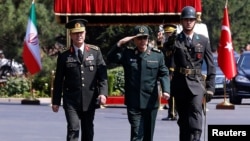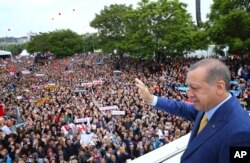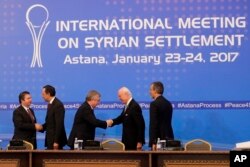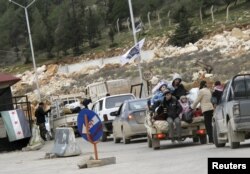In a rare visit, the head of Iran’s armed forces is in Turkey. The two neighbors have found themselves increasing rivals in Iraq and Syria, but both sides are trying to find common ground.
The chief of staff of the Iranian armed forces, Major General Mohammad-Hossein Baqeri, arrived in Ankara, leading a high-ranking military and political delegation, for three days of talks. It is the first visit by Iran’s chief of staff since the 1979 Iranian revolution.
Regional rivalries
Former Turkish ambassador to Iraq Unal Cevikoz now heads the Ankara Policy Forum. He says conflicts in Iraq and Syria have exacerbated regional rivalries.
"Iran is becoming a very important actor in the region, particularly in Iraq and Syria," he said. "It seems Iran has certain intentions. And when we look at the Turkish Iranian relations pertaining to the situation in Iraq and Syria, it is obvious Turkey and Iran are not on the same page."
Turkish President Recep Tayyip Erdogan has positioned himself as an advocate of Sunni Muslim rights in the region and has been in the forefront of criticizing Tehran’s policy in Iraq and Syria.
Erdogan has strongly criticized the treatment of Sunnis by Iraqi militia backed by Tehran. Ankara is one of the main supporters of Syrian rebels fighting the Damascus government supported by Iran.
The Iranian general's visit comes as Tehran, Ankara and Moscow are cooperating in what is called the Astana process to resolve the Syrian civil war. The conflict is expected to be discussed during the visit.
Idlib enclave
Political columnist Semih Idiz of the Al Monitor website says talks will include the Syrian enclave of Idlib, one of the last areas the rebel forces control.
"Idlib is a potential hornets nest. There is infighting there between two radical Islamist groups," said Idiz. "One is considered nominally more moderate and supported by Turkey and the other one more close to ISIS in sentiment. It is not clear how that is going to play out in Idlib and [Syrian President] Assad is going to take advantage of that."
Idlib borders Turkey, and there are growing concerns in Ankara that if it is overrun by Syrian government forces Turkey could experience a major refugee influx, which could include many radical jihadists. Last week Ankara closed its border crossing into Idlib due to security concerns.
The aspirations of the region’s Kurds is also expected to be on the Iranian general’s agenda in Ankara, with both countries having large and restive Kurdish minorities. Next month's independence referendum by Iraqi Kurds will provide common ground, with Tehran and Ankara strongly opposing the vote.




